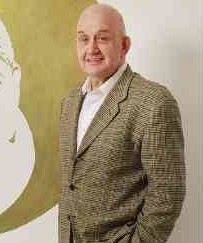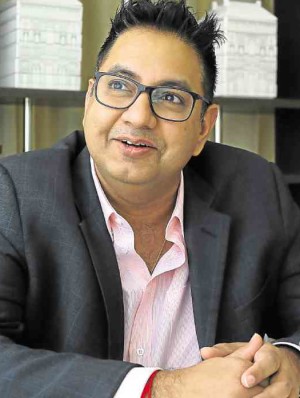‘Sustainable’ success decoded
Whether you’re a captain of industry or someone who has yet to reach his professional goals, “activational” speaker Anand Chulani gives the same advice: Don’t think of just achieving success; rather, be more concerned about how you can sustain it.
“It’s all about sustainable success,” said Chulani—more popularly known as “AC”—a world-renowned “legacy advisor” and “peak performance coach” to top business leaders, athletes, and even Hollywood stars.
“Most people want everything fast: Wi-Fi, food, everything. But driving fast with no alignment is a recipe for disaster. You’ll crash. So, drive fast—I will accelerate you—but let’s sustain that success, not just achieve it,” he said.
Chulani was in the country recently as guest speaker of the Entrepreneurs’ Organization (EO) Philippines’ forum titled “Never Settle: Sustaining Success and Leveraging Uncertainty,” held in Taguig City.
EO is an international network of over 12,000 business owners, and has 160 chapters in 50 countries. The one-day event gave EO members an exclusive peek into how Chulani coaches people into becoming, as he calls them, “absolute champions.”
Article continues after this advertisement“I’m on a mission—it’s not a job for me,” he said. “I’m on a mission to inspire and transform a generation of people to be happy, confident, successful. I want to be around people who aren’t just driven, but want to be champions in four areas of life: personal, business, family, and community—what I call an absolute champion.”
Article continues after this advertisementTo become a champion, Chulani works on creating an “alignment” among the four aforementioned life areas. He said it was all about changing a person’s mindset, from that of a warrior to a king or queen.
“Most people today are in their business, not on it. They’re in their family, not on them. They’re seeing their world from the mindset of a warrior; they’re battling every day. They’re not seeing it from the mindset of a king or a queen, where they’re on it, seeing the big picture,” Chulani said.
To explain, Chulani shared the story of a family he had met in another EO chapter: “There was one woman who kept looking at me, and there was something in my intuition that said, she needs support. So I ask, what’s stressing you out? And she says, my child; he’s leaving the house. I made him stand up, and I ask, well how do you feel? He says, I want to pursue my career but I feel pressured. So I say, I know what’s really happening here: Your mother is using you as a kind of drug to fulfill her need for love, which is putting on you guilt and pressure.”
It turned out that a younger, 15-year-old son was also in the room. When Chulani asked him about his feelings, the boy replied that he felt sad—to which Chulani replied, “Yes, because I know that [when your brother leaves] you’re going to be the drug of choice at home.”
At that point, Chulani asked for the father to stand up—and to his surprise, it was the man who hosted his stay.
“I asked [the father], are you aware of your 17-year-old’s problem? And he said, yes. How about your 15-year-old’s, and he said, no,” said Chulani. “I knew he was a good guy, but in today’s world, good is not good enough anymore. You’ve got to raise your standards. I told him, no matter how good you are as a man, the reason you guys are all stressed out is because you aren’t giving your wife certainty. You can give her everything financially, but your ultimate present is your presence.”
In less than an hour, Chulani was able to patch things up with the parents, and at the same time, put the two sons’ worries and fears to rest. “I asked [the two boys], what changed? None of them said a word but just looked at their father,” said Chulani, “And I said, see, the princes are now confident to go out into the world because they know the king will be at home to take care of the queen.”
Chulani had another similar experience in a different EO forum, wherein a man and his wife were having troubles both in their relationship and in setting up their new businesses. In front of the whole crowd, Chulani was able to convince the man to call his wife on the spot and apologize for his shortcomings.
“He got a standing ovation,” Chulani recalled. “I wanted him to start making decisions, because decision-making is like a muscle. More importantly, his story is so relatable—many people take their relationships for granted—that I knew he would inspire 80 percent of the people in the room.”
Such is how Chulani works with his clients: First, he “activates” their spirit, mind and body, and aligns them toward the legacy that they want to achieve and sustain—then works with the people around them, be it their colleagues or family, to make sure that they, too, are aware of that legacy.
As a peak performance coach, Chulani helps people be in their best state every day by finding “the success formula” that works for them.
“I’m a realist. I’m not here to tell you what to do. I’m here to help you find the courage, the confidence you need to do what you know best serves you and your kingdom. And if you’re on your own way, I will tell you that,” he said.
Ultimately, sustainable success is all about understanding one’s gift—and finding ways to continuously grow it, Chulani said.
“We’ve all been asked a ridiculous question: What do you want to be when you’re older? It implies that you’re not someone, and then you’ll be someone. It only creates stress and fear, instead of passion and growth,” he said. “[The question should be], what’s your gift, and how do you share it? Why wait till you’re 80 to share your gift? It could be in you when you’re 3 years old.”


